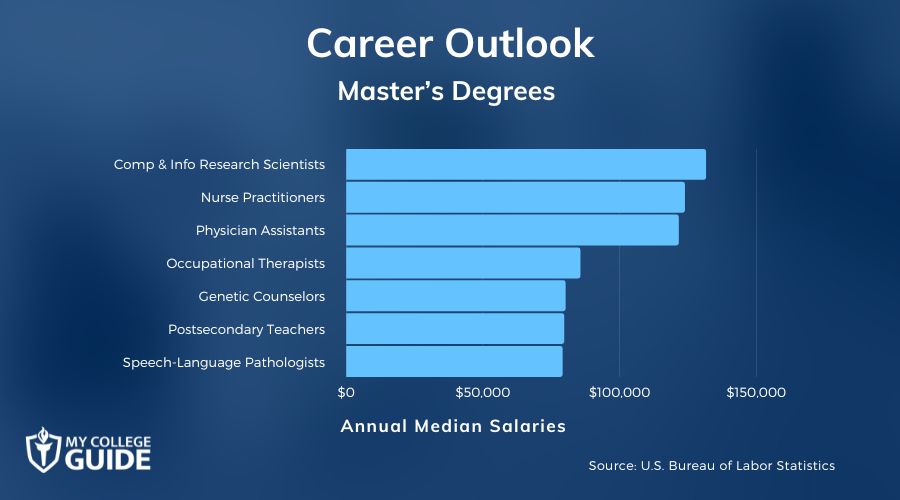If you have your bachelor’s degree, you may be asking yourself, “Should I get a masters degree?”

Continuing your education at the graduate level is a big decision. It will take time, money, and effort.
Editorial Listing ShortCode:
Before you make that commitment, it’s important to learn what a masters degree is and decide if it’s the best choice for you and your future.
Should I Get a Masters Degree?

Earning your master’s degree can potentially increase your salary potential or give you an edge in acquiring your dream job. Some careers even require master’s degrees to obtain. Master’s degree programs can also help you delve deeper into fields of study you are passionate about.
Editorial Listing ShortCode:
Whether or not a master’s degree is right for you depends on your personal goals and interests. Considering the following questions may help you decide if you should pursue a master’s degree:
- Is There an Online Master’s Program That Will Help Me Reach My Career Goals? In most cases, the answer is yes. Online learning is so popular that you can earn a master’s online in most fields, though some, such as the medical field, may require on-campus intensives. field experiences, or hybrid programs.
- What Are the Benefits of Getting a Master’s Degree Online Rather Than on Campus? Online master’s degree programs can offer flexible schedules, accelerated courses, access to schools around the world, and the opportunity to study at one’s own pace from anywhere with an internet connection.
- What Are the Drawbacks of Getting a Master’s Degree Online? There are fewer opportunities for personal interaction with professors and peers, not all majors are available, more self-direction and personal responsibility are required, and there are fewer networking opportunities.
- Do I Have the Right Personality to Be an Online Learner? Online programs are typically easier for those who are self-motivated, self-disciplined, organized, self-aware, and comfortable using technology.
- Will Getting a Master’s Degree Pay Off in My Field? In almost all professions, the answer is yes – a higher degree typically equals a higher salary. You could potentially earn hundreds of dollars more each week. There are a few professions in which earning your masters will not have much of a payoff, though. For example, according to the Bureau of Labor Statistics (BLS), petroleum engineers and chemical engineers typically do not see much of an increase in earnings after earning a master’s degree.
- Do I Have Time to Earn a Master’s Degree Online? You probably do because online learning is often remarkably flexible! You may be able to fit classes or studying in on your commute, over your lunch hour, while making dinner, or while your kids are in bed.
- Can I Afford to Earn a Master’s Degree Online? At most colleges and universities, the tuition for online degree programs is the same or less than the tuition for on-campus programs. Online masters programs may also allow you to save on additional fees that tend to add up, such as out-of-state tuition fees, commuting and parking fees, and pricy textbooks. But even with those cost savings, higher education is never cheap. You may need financial aid to help pay for your online master’s program.
Earning a master’s degree can be a game-changer, but it’s important to plan wisely. Taking the time to think about these questions and your personal goals can help you be sure you’re making the best decision for yourself and your future. Ultimately, you need to ask yourself, “Is a master’s degree right for me?”
Common Reasons to Pursue a Master’s Degree

Deciding whether to pursue a master’s degree or not is a personal decision that will ultimately be decided by your own interests and goals. There are some common reasons that people decide to earn a master’s degree.
If you wish to do any of the following, earning a master’s degree may be right for you.
- Advance in your career. Earning a master’s degree can help open the door to upper-level positions and qualify you for management or supervisory roles.
- Earn a higher salary. While salary earnings are dependent upon a number of factors, earning a master’s degree can typically increase earning potential. According to the BLS, the median weekly earnings for those with a master’s degree is $1,661, compared to $1,432 for those with only bachelor’s degrees.
- Transition to a new career. With a master’s degree, you may be able to move to a new position within your field, or if you are feeling stuck or unhappy in your career field, you may even be able to transition to a whole new field. While some master’s programs require applicants to have bachelor’s degrees in a related field, many do not.
- Delve deeper into your interests. A master’s program will typically allow you to dig even further into topics in your field of study, even allowing you to specialize in niche topics.
Many professionals find earning a masters degree is worth it. There are many reasons to get a masters degree. If any of the things we’ve listed interest you, then earning a master’s degree online may be right for you too.
Master’s Degree Careers & Salaries

A master’s degree can potentially open the door to many new career opportunities. Some jobs require advanced training and knowledge, so professionals who want to work in these roles must obtain a master’s degree. For example, clinical psychologists and nurse practitioners need graduate-level training.
Other career paths don’t require a master’s degree to get started, but a graduate education may help professionals advance in their careers more quickly. Many careers in the healthcare industry require a master’s degree.
Editorial Listing ShortCode:
For instance, physician assistants must earn a master’s degree in physician assistant studies and pass a national certification exam. Similarly, all states require marriage and family therapists to complete a master’s degree in the field.
A master’s degree is an entry-level requirement for numerous careers in the education sector. A college professor at a community college must have a master’s degree in a relevant field, and school principals and superintendents usually have a master’s in education administration.
According to the Bureau of Labor Statistics (BLS), these are ten careers that require a master’s degree and their annual median salaries.
| Careers | Annual Median Salaries |
| Computer and Information Research Scientists | $131,490 |
| Nurse Anesthetists, Nurse Midwives, and Nurse Practitioners | $123,780 |
| Physician Assistants | $121,530 |
| Occupational Therapists | $85,570 |
| Genetic Counselors | $80,150 |
| Postsecondary Teachers | $79,640 |
| Speech-Language Pathologists | $79,060 |
| Librarians and Library Media Specialists | $61,190 |
| School and Career Counselors and Advisors | $60,510 |
| Marriage and Family Therapists | $49,880 |
Additionally, a master’s degree can be helpful for many managerial positions in business, finance, and other industries.
Pros and Cons of Getting a Master’s Degree
Today, nearly all colleges and universities offer a variety of courses and even entire degree programs online. And more and more students – especially adult learners pursuing graduate degrees – are taking advantage of this convenient option.
Online learning is not a good fit for all learners, though, so it’s important to do your research and consider the pros and cons of online education.
| Pros of Getting a Master’s Degree Online | Cons of Getting a Master’s Degree Online |
|
|
These are just some things to consider when deciding if earning a master’s degree online is right for you. You may wish to speak with an admissions counselor at your prospective school for more information. They can help you decide if the time and financial commitments involved in getting a master’s degree will be worth it to you.
How to Choose an Online Master’s Program

Once you decide to pursue a master’s degree, you’ll need to find the right school. Here are a few considerations to keep in mind as you explore online master’s programs:
- Financial Assistance: Many graduate programs offer financial aid for eligible students. This assistance could come through grants, scholarships, or research or teaching assistantships. For example, you may receive a tuition waiver and a stipend in exchange for teaching an undergraduate class or assisting a professor with a research project.
- Flexibility: Students must often balance their graduate studies with family obligations, hobbies, and work. As a result, many master’s programs offer asynchronous online courses that allow students to complete work on their own schedule. Evening classes can also provide more flexibility for busy learners.
- Professional Development Opportunities: Some online programs provide additional opportunities for professional development beyond the classroom. For example, you may participate in a virtual resume workshop or attend virtual lectures by guest speakers. These activities can help you learn useful skills and network with other professionals in your field.
- Placement Rates: Many master’s programs collect data about their graduates’ career outcomes. A high placement rate may indicate that a program provides exceptional career services and networking opportunities. You can ask the program directly if you don’t see this information on its website.
These four factors can help you find an online master’s program that fits your personal and professional needs.
What Masters Degree Should I Get?

Your career goals, passions, and previous educational experiences can help you pick a master’s degree. Here are four popular master’s degrees you may wish to consider:
- Master’s in Business Administration (MBA): This versatile degree is designed to enhance business knowledge and leadership skills. You’ll likely study a broad range of subjects, like business economics, entrepreneurship, and ethical decision-making. Graduates often pursue careers in human resources, marketing, and other areas.
- Master’s in Cybersecurity: This master’s degree focuses on strategies to defend computer networks and private data from cyberattacks. Coursework typically covers topics like encryption algorithms, ethical hacking, and risk analysis.
- Master’s in Engineering (MEng): This degree explores advanced engineering practices and theories. It can help prepare you for careers in specialized areas of engineering, like biomedical engineering, product design and manufacturing, or robotics.
- Master’s in Healthcare Administration (MHA): This degree trains students for administrative and managerial roles in healthcare facilities. You will likely study data analytics, health informatics, managed care, and other related topics. You may also develop management and problem-solving skills.
You may find it helpful to research the educational backgrounds of current professionals in your preferred career path.
Common Alternatives to a Masters Degree

There are many benefits of a masters degree, but it’s not necessary for everyone. If you are still asking yourself, “Should I get a master’s degree?” it may be helpful to consider your alternatives.
You may be able to achieve your personal and professional goals through alternative pathways, such as:
- Apprenticeships: You can gain hands-on experience and work on real projects by apprenticing with an experienced mentor in your field.
- Bootcamps: These short programs focus on career-ready technical skills, such as coding, user experience design, and web development.
- Certificates: Post-bachelor’s certificate programs typically take less time to complete than a master’s degree and allow you to develop specialized knowledge in an area like cybersecurity, data analytics, or public administration.
- Online Classes: Massively open online courses are free classes that allow unlimited numbers of students to study a subject.
- Professional Development Seminars: Professional organizations often host seminars and workshops that allow members to network and learn about new topics.
- Video Tutorials: Websites like YouTube have thousands of free video tutorials that you can watch to learn coding, web design, and other skills.
These options are generally more affordable and less time-consuming than a master’s degree, so they can be attractive alternatives for many people looking to upskill or study their passions.
Graduate Degree Admissions Requirements

Master’s programs often admit fewer students than bachelor’s programs and have more demanding courses. As a result, graduate schools typically have stricter admissions criteria, though the specific requirements depend on the institution and discipline.
Here are a few application materials you may need to provide when applying for a master’s program:
- GRE or GMAT scores (not all schools require them)
- Personal statement describing your education, experience, and career plans
- Letters of recommendation
- Writing sample
Some programs also require applicants to complete an in-person or virtual interview with department faculty.
Master’s Degree Programs Accreditation

You can be more assured that you’ll receive a high-quality education by enrolling in an accredited online master’s program.
Accreditation is a voluntary process that colleges and universities undertake to demonstrate that they meet quality standards set by external accrediting agencies. These organizations evaluate many aspects of a program, like courses, faculty credentials, and support services.
Editorial Listing ShortCode:
Earning a master’s degree from an accredited online program can give you more credibility because employers can trust that you’ve received top-notch training. Also, you must attend an accredited college or university to qualify for many types of financial assistance, like federal grants.
Financial Aid and Scholarships

Many master’s students seek financial assistance to help cover the cost of tuition, distance learning fees, textbooks, and other expenses.
Colleges and universities may offer research and teaching assistantships for eligible students. These opportunities often come with tuition remission, healthcare benefits, and modest stipends. An English graduate student may teach first-year writing courses, while a biology graduate student could collect samples in the field for a professor’s research project.
Graduate students can also explore financial aid opportunities from the federal and state governments. The federal government offers grants, scholarships, and work-study programs for students who meet specific criteria. Additionally, many students use federal student loans to help pay for graduate school. You may also qualify for state-based financial aid, such as grants and scholarships for state residents.
You can fill out the Free Application for Federal Student Aid (FAFSA) to discover if you’re eligible for financial assistance.
What Is a Master’s Degree?

A master’s degree is a way to expand your knowledge of a field and develop new soft and technical skills. You can study advanced concepts and theories and learn about their professional applications. Many master’s programs also cover research methods and require students to write a master’s thesis.
Unlike an undergraduate degree, a master’s degree doesn’t include general education courses. As a result, full-time students can typically complete this type of postgraduate degree in 1 to 2 years. Some students pursue a doctoral degree after graduation, while others start their careers or get promoted to more senior positions.
What Can You Do with a Masters Degree?

The potential to unlock new career opportunities is one of the top benefits of a masters degree. Many highly skilled, in-demand jobs require this degree.
For example, a masters in archival science can prepare you to pursue a career as an archivist, curator, or museum worker. The BLS predicts 12% job growth for these occupations in the next decade. Likewise, a masters in nurse anesthesia or nursing could help you secure a role in the healthcare industry.
The BLS anticipates the demand for nurse anesthetists, nurse midwives, and nurse practitioners will increase by 40%.
Do You Need a Bachelors to Get a Masters Degree?

Many master’s programs only admit students with bachelor’s degrees in a related field. For example, a master in marketing program may accept students with bachelor’s degrees in communication, English, or marketing.
However, a few master’s programs will accept students without a bachelor’s degree under certain conditions. Some colleges and universities offer dual bachelor’s and master’s degree programs, which allow students to complete both degrees without reapplying.
Editorial Listing ShortCode:
Fields offering combined degree options include accounting, engineering, nursing, and psychology, among others. Enrolling in a combined bachelor’s and master’s program may allow you to graduate faster and reduce tuition costs
Is a Masters Degree Hard?

Master’s degree programs are designed to teach students more complex concepts and skills in their chosen discipline. Therefore, a master’s degree is usually more challenging and time-consuming than a bachelor’s degree.
The courses you take will depend on your discipline and school, but here are a few examples of master’s level classes:
- Business Statistics
- Consumer Analytics
- Integrated Clinical Management
- Macroeconomics
- Pathophysiology
- Philosophy of Education
Additionally, you may be required to research a topic in your field and produce an original master’s thesis. Many students find this task complex and labor-intensive.
How Much Does a Master’s Degree Cost Online?

Many factors can influence the cost of an online master’s degree, including the school and type of degree. The Education Data Initiative reports that the average cost of a master’s degree is $62,500. Online programs may cost less than in-person options because students don’t need to pay for room and board.
Although tuition varies, you will likely pay between $300 and $1,000 per credit hour when pursuing a master’s degree online. You may be able to reduce your educational expenses with financial aid like grants and teaching assistantships.
How Long Does It Take to Get a Master’s Degree Online?

The time it takes to finish a master’s degree can vary depending on the curriculum, semester schedule, and enrollment status. Most master’s programs require students to complete 30 to 40 credit hours.
A 36 credit hour program with no thesis requirement usually takes 1 year to complete if enrolled full-time with summer classes. Without summer classes, it typically takes 1.5 to 2 years to complete. Writing a master’s thesis usually adds a semester or two to the program’s length. Additionally, enrolling part-time can extend the time to completion.
What’s the Difference between a Masters vs. Bachelors Degree?
Masters degrees and bachelors degrees have several significant differences:
| Masters Degree | Bachelors Degree |
|
|
If you want to deepen your knowledge or advance your career, a master’s degree could be right for you.
Is a Masters Worth It?

Yes, a masters is worth it for many students. A postgraduate degree can give you the opportunity to develop expertise in your chosen field and learn about the latest research developments. It can also help you improve your collaboration, communication, project management, and self-discipline skills.
Editorial Listing ShortCode:
Earning a master’s degree can help you unlock new or more advanced career opportunities. People often pursue a master’s degree when they want to switch careers. Graduates also use this degree to apply for higher-paying jobs in their field or become more competitive for promotions. Earning a master’s may also have personal benefits. like increased confidence, credibility, and self-esteem.
Getting Your Masters Degree Online

People often ask, “Should I get my masters?” Earning this degree can give you the chance to learn more about a subject you enjoy and gain specialized abilities. It may also help you develop your research skills, especially if it requires the completion of a master’s thesis.
Graduates with a master’s degree may earn higher salaries and qualify for more advanced careers. The benefits of a masters degree may also include personal feelings of accomplishment and greater self-esteem.
You can start your path to graduate school by researching accredited online master’s programs today.
